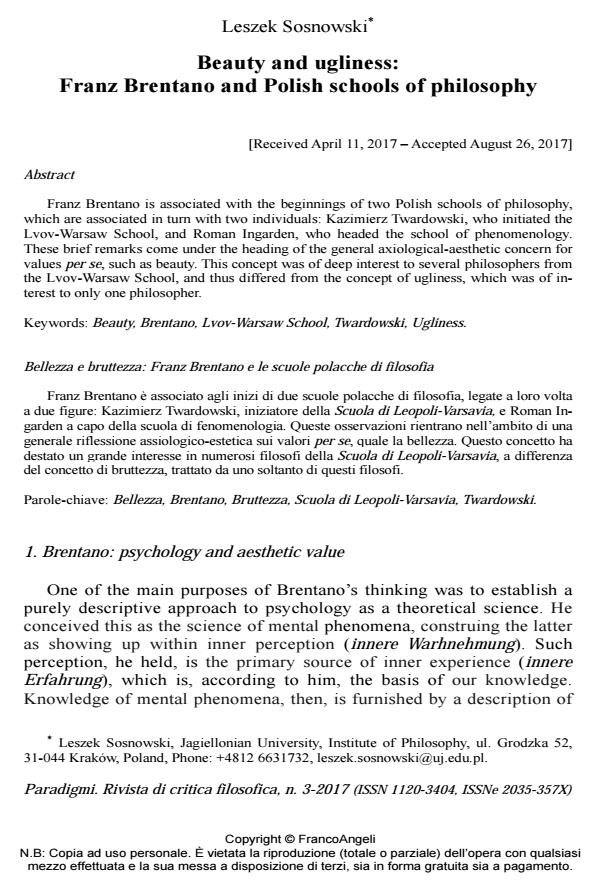Beauty and ugliness: Franz Brentano and Polish schools of philosophy
Titolo Rivista PARADIGMI
Autori/Curatori Leszek Sosnowski
Anno di pubblicazione 2017 Fascicolo 2017/3 Lingua Inglese
Numero pagine 17 P. 87-103 Dimensione file 211 KB
DOI 10.3280/PARA2017-003007
Il DOI è il codice a barre della proprietà intellettuale: per saperne di più
clicca qui
Qui sotto puoi vedere in anteprima la prima pagina di questo articolo.
Se questo articolo ti interessa, lo puoi acquistare (e scaricare in formato pdf) seguendo le facili indicazioni per acquistare il download credit. Acquista Download Credits per scaricare questo Articolo in formato PDF

FrancoAngeli è membro della Publishers International Linking Association, Inc (PILA)associazione indipendente e non profit per facilitare (attraverso i servizi tecnologici implementati da CrossRef.org) l’accesso degli studiosi ai contenuti digitali nelle pubblicazioni professionali e scientifiche
Franz Brentano is associated with the beginnings of two Polish schools of philosophy, which are associated in turn with two individuals: Kazimierz Twardowski, who initiated the Lvov-Warsaw School, and Roman Ingarden, who headed the school of phenomenology. These brief remarks come under the heading of the general axiological-aesthetic concern for values per se, such as beauty. This concept was of deep interest to several philosophers from the Lvov-Warsaw School, and thus differed from the concept of ugliness, which was of interest to only one philosopher.
Franz Brentano è associato agli inizi di due scuole polacche di filosofia, legate a loro volta a due figure: Kazimierz Twardowski, iniziatore della Scuola di Leopoli-Varsavia, e Roman Ingarden a capo della scuola di fenomenologia. Queste osservazioni rientrano nell’ambito di una generale riflessione assiologico-estetica sui valori per se, quale la bellezza. Questo concetto ha destato un grande interesse in numerosi filosofi della Scuola di Leopoli-Varsavia, a differenza del concetto di bruttezza, trattato da uno soltanto di questi filosofi.
Keywords:Bellezza, Brentano, Bruttezza, Scuola di Leopoli-Varsavia, Twardowski.
- Brentano F. (1895). Meine letzten Wünsche für Österreich (My Last Wishes for Austria). Stuttgart: Verlag der Cotta’schen Buchhandlung.
- Brentano F. (1921). Vom Ursprung sittlicher Erkenntnis (The Origin of Moral Knowledge), hrsg. von O. Kraus, Leipzig: Felix Meiner Verlag.
- Brentano F. (1924). Psychologie vom empirischen Standpunkt I (Psychology from an Empirical Standpoint I), hrsg. von O. Kraus, Leipzig: Felix Meiner Verlag.
- Brentano F. (1956). Die Lehre vom richtigen Urteil (The Doctrine of Correct Judgement), hrsg. von F. Mayer-Hillebrand, Bern: Francke Verlag.
- Brentano F. (1959). Grundzüge der Ästhetik (Principles of Aesthetics), hrsg. von F. Mayer-Hillebrand, Bern: Francke Verlag.
- Czeżowski T. (1938). Propedeutyka filozofii (Introduction to Philosophy). Lwów: Książnica-Atlas.
- Czeżowski T. (1965a). Filozofia na rozdrożu (Philosophy at the Crossroads). War-szawa: PWN.
- Czeżowski T. (1965b). Czym są wartości? (Wprowadzenie do dyskusji) (What are Values? (Introduction to the Discussion)). Znak, 130: 408-410.
- Czeżowski T. (2000). Knowledge, Science and Values. A Program for Scientific Philosophy, ed. by L. Gumański, Amsterdam-Atlanta: Rodopi.
- Czeżowski T. (20043). O metafizyce, jej kierunkach i zagadnieniach (On Metaphysics, its Orientations and Problems). Kęty: Antyk.
- Dąmbska I. (1979). O niektórych punktach stycznych filozofii T. Czeżowskiego i F. Brentano (On Some Philosophical Similarities between T. Czeżowski and F. Brentano). Studia Filozoficzne, 8: 19-25.
- Dziemidok B. (1980). Teoria przeżyć i wartości estetycznych w polskiej estetyce dwudziestolecia międzywojennego (Theory of Aesthetic Experience and Values in the Polish Aesthetics of the Two Interwar Decades). Warszawa: PWN.
- Huemer W. (2017). Brentano on Beauty and Aesthetics. In: Kriegel U., ed. Routledge Companion to Brentano and the Brentano School. London & New York: Routledge: 202-209.
- Ingarden R. (1963). Z badań nad filozofią współczesną (Inquiries into Contemporary Philosophy). Warszawa: PWN.
- Łukasiewicz D. (2009). Polish Metaphysics and the Brentanian Tradition. In: Lapointe S. et al., eds. The Golden Age of Polish Philosophy: Kazimierz Twardowski’s Philosophical Legacy. Dordrecht: Springer: 19-31.
- Ossowski S. (1966) (19331). U podstaw estetyki (The Foundations of Aesthetics). In: Dzieła (Works). Vol. 1. Warsaw: PWN (Engl. transl. The Foundations of Aesthetics. Dordrecht: D. Reidel Publishing Co., 1978).
- Paczkowska-Łagowska E. (1977), On Kazimierz’s Ethical Investigations, Reports on Philosophy, 1: 11–21.
- Pękala T. (1997). Estetyka otwarta Mieczysława Wallisa (The Open Aesthetics of Mieczysław Wallis). Warszawa: IK.
- Smith B. (1994). Austrian Philosophy. The Legacy of Franz Brentano. Chicago: Open Court.
- Spiegelberg E. (19823) (1960). The Phenomenological Movement: A Historical Introduction. Dordrecht: Kluwer.
- Tatarkiewicz W. (1978). Parerga. Warszawa: PWN.
- Tatarkiewicz W. (1980). A History of Six Ideas: an Essay in Aesthetics, transl. by C. Kasperek. Warsaw: PWN; The Hague: M. Nijhoff Publisher.
- Tatarkiewicz W. (19863) (19681). Pojęcie wartości (The Notion of Value). In: O filozofii i sztuce (On Philosophy and Art). Warszawa: PWN.
- Twardowski K. (1894). Zur Lehre vom Inhalt und Gegenstand der Vorstellungen. Eine psychologische Untersuchung (On the Doctrine of the Content and Object of Ideas: a Psychological Investigation). Wien: Hölder.
- Twardowski K. (1973). O zadaniach etyki naukowej. Wykładów z etyki część III (On the Task of Scientific Ethics. Lectures on Ethics, part III). Etyka, 12: 125-155.
- Wallis M. (1968) (19321). Przeżycie i wartość. Pisma z estetyki i nauki o sztuce 1931-1949 (Experience and Value. Writings from the Aesthetics and Science of Art). Kraków: WL.
- Witwicki W. (1925). Psychologia (Psychology). Vol. 2. Lwów: Książnica-Atlas.
- Witwicki W. (1947). Uczucia estetyczne (Aesthetic Feelings). Łódź: Czytelnik.
- Witwicki W. (1949). List o estetyce (A Letter on Aesthetics). Przegląd Filozoficzny, XLV/1-2: 23-25.
- Witwicki W. (1958). Objaśnienia tłumacza (A Translator’s Commentary). In: Plato, Hippiasz większy (Hippias Major). Warszawa: PWN: 119-147.
- Wiśniewski R. (1979). Teoria wartości estetycznej Władysława Tatarkiewicza (Władysław Tatarkiewicz’s Theory of Aesthetic Value). Studia Estetyczne, 16: 151-171.
- Woleński J. (1989). Logic and Philosophy in the Lvov-Warsaw Philosophical School. Dordrecht: Kluwer.
- Znaniecki F. (1927). The Object-Matter of Sociology. American Journal of Sociology, 4: 52-584.
Leszek Sosnowski, Beauty and ugliness: Franz Brentano and Polish schools of philosophy in "PARADIGMI" 3/2017, pp 87-103, DOI: 10.3280/PARA2017-003007